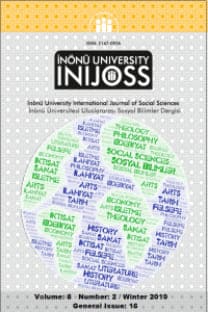JOHN FOWLES’UN FRANSIZ TEĞMENİN KADINI ROMANINDA VAROLUŞ ARAYIŞI
Bu
makale Yirminci yüzyıl İngiliz romancısı John Fowles’un 1969 yılında
yayımladığı Fransız Teğmenin Kadını
romanını Fransız filozof, oyun yazarı ve romancısı Jean Paul Sartre’ın
Varoluşçu felsefesi doğrultusunda incelemeyi amaçlamaktadır. Tıpkı Sartre gibi
Fowles da insanın özgürlüğü ve bireyin içinde yaşadığı toplumun kısıtlamalarına
ragmen varoluş mücadelesi konularına ilgi duymuştur. Fowles Fransız Teğmenin Kadını romanında temel
olarak bireyin özgürlüğü ve varoluşu sorununu romandaki Sarah ve Charles
karakterleri ve Charles’ın Ernestina ile olan ilişkisi düzleminde ele almıştır.
Fowles’un romanında ortaya attığı temel sorunlar “özgür irade var mıdır?”, “özgürce
hareket etmek mümkün müdür?”, “eğer mümkünse bu nasıl başarılabilir?” (Neary,
1992:20) şeklindedir. Bu makaleye göre Viktorya Dönemi’nin gelenekselci
koşullarında Sarah’nın Sartre’a göre olan Varoluşçu düşünce bağlamında hem
toplumsal hem de varoluşsal biçimlerde kendi özgürlüğüne ulaşabildiği,
Charles’ın ise özgürce hareket etmeyi başaramadığı ve kendine ait bağımsız bir
yaşama erişemediğine dikkat çekmektedir.
Anahtar Kelimeler:
John Fowles, Fransız Teğmenin Kadını, Sartre, Varoluşçuluk
THE QUEST FOR EXISTENCE IN JOHN FOWLES’ THE FRENCH LIEUTENANT’S WOMAN
This
essay aims to analyse Twentieth-century English novelist John Fowles’ 1969
novel The French Lieutenant’s Woman
in terms of French philosopher, playwright, and novelist Jean Paul Sartre’s
Existentialist philosophy. Like Sartre, Fowles mainly shows concern about the
question of human freedom and human beings’ struggle to exist despite the
restrictions of the society they live in. In his The French Lieutenant’s Woman Fowles basically discusses the issue
of personal freedom and existence through the characters Sarah and Charles, and
through Charles’ relationship with Ernestina.
The main questions Fowles raises in his novel are “is there free will?”,
“can choose freely?”, “can we act freely?”, and “how can we do it?” (Neary,
1992: 20). This article proposes that in the conventional circumstances of the
Victorian society, Sarah manages to create her freedom both socially and
existentially in terms of Sartrean existentialist ideology. Charles, on the
other hand, fails to act freely and create an independent life of his own
Keywords:
John Fowles, The French Lieutenant’s Woman, Sartre, Existentialism,
___
Başak, Oya. John Fowles: Novelist as Thinker. İstanbul: Boğaziçi UP, 1976.Foster, Thomas C. «The French Lieutant's Woman: Postmodern Victorian.» Understanding John Fowles. Columbia: University of South Carolina Press, 1994. 72-85.
Fowles, John. The French Lieutant's Woman. London: Vintage, 2004.
Killinger, John. «Existentialism and Human Freedom.» The English Journal May 1961: 303-313. <https://www.jstor.org/stable/810349 >.
Lynch, Richard P. «Freedoms in "The French Lieutant's Woman".» Twentieth Century Literature Spring 2002: 50-76. <https://www.jstor.org/stable/3175978>.
Murfin, Ross. «Existentialism.» Murfin, Ross ve Supryia M. Ray. The Bedford Glossary of Critical and Literary Terms. Boston: Bedford Book, 1997. 146.
Neary, John. Something and Nothingness: The Fiction of John Updike and John FOwles. Carbondale: Southern Illinois UP, 1992.
Perkins, Wendy. «Critical Essay on "The French Lieutenant's Woman.» Novels for Students. Cilt 21. Thomson and Gale, 2003.
Pifer, Ellen. «John Fowles.» Biography, Dictionary of Literary. British Novelists Since 1960. Cilt 14. Gale Research, 1983. 309-336.
Sartre, Jean-Paul. Being and Nothingness: An Essay on Phenomenological Ontology. Routledge, 2003.
Solomon, Robert C. From Hegel to Existentialism. New York: Oxford UP, 1987.
Wang, Stephen. «Reason and Limits of Existential Freedom.» Philosophy Today Fall 2006: 338.
- ISSN: 2147-0936
- Yayın Aralığı: Yılda 2 Sayı
- Yayıncı: İnönü Üniversitesi
Sayıdaki Diğer Makaleler
FRANCİS POULENC’İN KLARNET VE PİYANO İÇİN SONAT’ININ KLARNET İCRACILIĞI YÖNÜNDEN İNCELENMESİ
JOHN FOWLES’UN FRANSIZ TEĞMENİN KADINI ROMANINDA VAROLUŞ ARAYIŞI
İBNÜLEMİN MAHMUD KEMAL İNAL İLE KEMALEDDİN HARPUTÎ EFENDİ’NİN MEKTUPLAŞMALARI- I
HİPODERMİK İĞNE MODELİ BAĞLAMINDA NAZİ PROPAGANDASININ WALT DİSNEY ÇİZGİ FİLMLERİNDE ELEŞTİRİSİ
MALATYA HAVZASI’NDA SICAKLIK VE YAĞIŞIN TREND ANALİZİ
JOHN LOCKE’DA ÖZGÜRLÜK -DOĞA DURUMU VE MÜLKİYET HAKKI BAĞLAMINDA-
BAĞIMSIZ DENETİMDE KAMU GÖZETİM KURUMLARININ ÖNEMİ: GELİŞMİŞ ÜLKE UYGULAMALARI
Birgül BOZKURT YAZAR, Zülkif YALÇIN
SHAKESPEARE’İN OTHELLO ESERİNDE GÖRÜNEN VE GERÇEKLİK ARASINDAKİ ÇATIŞMA
